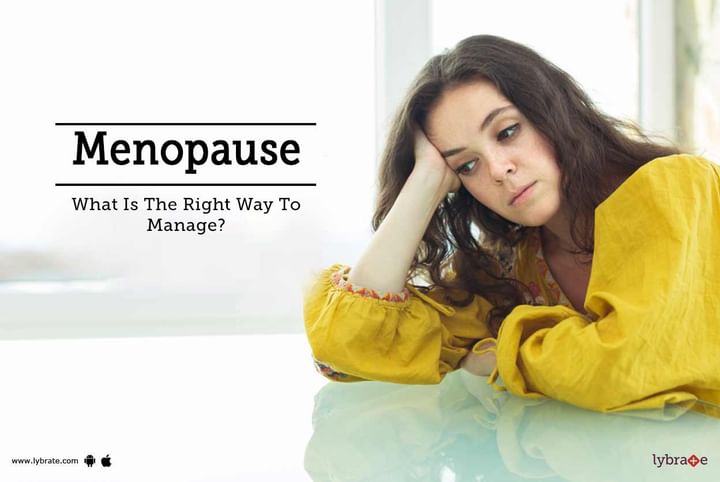Menopause - What Is The Right Way To Manage?
Menopause is the time in your life when you naturally stop having menstrual periods. Menopause happens when the ovaries stop making hormones. Menopause marks the end of the reproductive years. The average age that women go through menopause is 51 years.
The years leading up to menopause are called perimenopause. Cycles may become longer than usual for you or become shorter. You may begin to skip periods. The amount of flow may become lighter or heavier. Although changes in menstrual bleeding are normal during perimenopause, you still should report them to your doctor. Abnormal bleeding may be a sign of a problem.
What are the other signs and symptoms of menopause?
Some women do not have any symptoms of perimenopause or have only a few mild symptoms. Others have many symptoms that can be severe. Common signs and symptoms include the following:
-
Hot flashes - A hot flash is a sudden feeling of heat that rushes to the upper body and face. It may last from a few seconds to several minutes or longer. Some women have hot flashes a few times a month. Others have them several times a day. Hot flashes that happen at night (night sweats) may wake you up and cause you to feel tired and sluggish during the day.
-
Sleep problems - You may have insomnia (trouble falling asleep), or you may wake up long before your usual time. Night sweats may disrupt your sleep.
-
Vaginal and urinary tract changes - As estrogen levels decrease, the lining of the vagina may become thinner, dryer, and less elastic. Vaginal dryness may cause pain during sex. Vaginal infections also may occur more often. The urethra can become dry, inflamed, or irritated. This can cause more frequent urination and increase the risk of urinary tract infections.
What types of bone changes can occur after menopause?
During the first 4–8 years after menopause, women lose bone more rapidly. This rapid loss occurs because of the decreased levels of estrogen. If too much bone is lost, it can increase the risk of osteoporosis. Osteoporosis increases the risk of bone fracture. The bones of the hip, wrist, and spine are affected most often.
What do other health risks increase during perimenopause and menopause?
The estrogen produced by women’s ovaries before menopause protects against heart attacks and stroke. When less estrogen is made after menopause, women lose much of this protection. Midlife also is the time when risk factors for heart disease, such as high cholesterol levels, high blood pressure, and being physically inactive, are more common. All of these combined factors increase the risk of heart attack and stroke in menopausal women.
What is hormone therapy?
Hormone therapy can help relieve the symptoms of perimenopause and menopause. Hormone therapy means taking estrogen and, if you have never had a hysterectomy and still have a uterus, a hormone called progestin. Estrogen plus progestin sometimes is called “combined hormone therapy” or simply “hormone therapy.” Taking progestin helps reduce the risk of cancer of the uterus that occurs when estrogen is used alone. If you do not have a uterus, estrogen is given without progestin. Estrogen-only therapy sometimes is called “estrogen therapy.”
How is hormone therapy given?
Estrogen can be given in several forms. Systemic forms include pills, skin patches, and gels and sprays that are applied to the skin. If progestin is prescribed, it can be given separately or combined with estrogen in the same pill or in a patch. With systemic therapy, estrogen is released into the bloodstream and travels to the organs and tissues where it is needed. Women who only have vaginal dryness may be prescribed “local” estrogen therapy in the form of a vaginal ring, tablet, or cream. These forms release small doses of estrogen into the vaginal tissue.
What are the benefits of hormone therapy?
Systemic estrogen therapy (with or without progestin) has been shown to be the best treatment for the relief of hot flashes and night sweats. Both systemic and local types of estrogen therapy relieve vaginal dryness. Systemic estrogen protects against the bone loss that occurs early in menopause and helps prevent hip and spine fractures. Combined estrogen and progestin therapy may reduce the risk of colon cancer.
What are the risks of hormone therapy?
Hormone therapy may increase the risk of certain types of cancer and other conditions:
-
Estrogen-only therapy causes the lining of the uterus to grow and can increase the risk of uterine cancer.
-
Combined hormone therapy is associated with a small increased risk of heart attack. This risk may be related to age, existing medical conditions, and when a woman starts taking hormone therapy.
-
Combined hormone therapy and estrogen-only therapy are associated with a small increased risk of stroke and deep vein thrombosis. Forms of therapy not taken by mouth (patches, sprays, rings, and others) may have less risk of causing deep vein thrombosis than those taken by mouth.
-
Combined hormone therapy is associated with a small increased risk of breast cancer.
-
There is a small increased risk of gallbladder disease associated with estrogen therapy with or without progestin. The risk is greatest with oral forms of therapy.
Can plant and herbal supplements help with menopause symptoms?
Plants and herbs that have been used for relief of menopause symptoms include soy, black cohosh, and Chinese herbal remedies. Only a few of these substances have been studied for safety and effectiveness. Also, the way that these products are made is not regulated. There is no guarantee that the product contains safe ingredients or effective doses of the substance. If you do take one of these products, be sure to let your doctor know.
Can vaginal moisturizers and lubricants help with menopause symptoms?
These over-the-counter products can be used to help with vaginal dryness and painful sexual intercourse that may occur during menopause. Vaginal moisturizers replace moisture and restore the natural acidity of the vagina and can be used every 2–3 days as needed. Lubricants can be used each time you have sexual intercourse.
What can I do to stay healthy after menopause?
A healthy lifestyle can help you make the best of the years after menopause. The following are some ways to stay healthy during midlife:
-
Nutrition—Eating a balanced diet will help you stay healthy before, during, and after menopause. Be sure to include enough calcium and vitamin D in your diet to help maintain strong bones.
-
Exercise—Regular exercise slows down bone loss and improves your overall health. Weight-bearing exercise, such as walking, can help keep bones strong. Strength training strengthens your muscles and bones by resisting against weight, such as your own body, an exercise band, or handheld weights. Balance training, such as yoga and tai chi, may help you avoid falls, which could lead to broken bones.
-
Routine health care—Visit your doctor once a year to have regular exams and tests. Dental checkups and eye exams are important, too. Routine health care visits, even if you are not sick, can help detect problems early.
In case you have a concern or query you can always consult an expert & get answers to your questions!



+1.svg)
